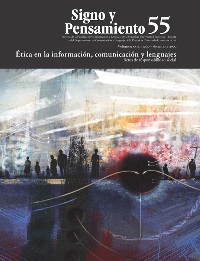Resumo
Este artigo sintetiza os ensinamentos que o autor adquiriu ao longo de vinte anos na fascinante tarefa de ensinar ética a estudantes universitários de tecnologias. Começa por realçar a distinção entre éticas normativas e éticas da responsabilidade, manifestando-se abertamente a favor das segundas, mas defendendo a sua conciliação com as primeiras, visto que predominam no mundo onde os jovens profissionais irão atuar. Partindo deste pressuposto, o resto do artigo procura explicar como é que o imperativo categórico de Kant, o modelo de desenvolvimento moral de Kohlberg e as propostas de Floridi para a ética da informação podem ser postos ao serviço dessa conciliação.
Covey, S. (1992). The Seven Habits of Highly Effective People, Londres, Simon & Schuster.
Figueiredo, A. D., & Cunha, P. R. (2007). Action Research and Design in Information Systems: Two Faces of a Single Coin. In Ned Kock (Ed.) Information Systems Action Research: An Applied View of Emerging Concepts and Methods (pp. 61-96). Springer.
Floridi, L. (1998). “Information Ethics: On the Philosophical Foundations of Computer Ethics”, Proceedings ETHICOMP98, The Fourth International Conference on Ethical Issues in Information Technology, Erasmus University.
Floridi, L. (2003). On the Intrinsic Value of Information Objects and the Infosphere. Ethics and Information Technology, vol. 4, núm. 4, pp. 287-304.
Floridi, L. (2006). A Look into the Future Impact of ICT on Our Lives. The Information Society, vol. 23, núm. 1, pp. 59-64.
Kant, I. (1964). The Groundwork of the Metaphysic of Morals. H. Paton. Kohlberg, L. (1971). From Is to Ought: How to Commit the Naturalistic Fallacy and Get Away with It in the Study of Moral Development. Academic Press.
Kohlberg, L. (1973). “The Claim to Moral Adequacy of a Highest Stage of Moral Judgment”. Journal of Philosophy, vol. 70, pp. 630-646.
Schön, D. (1983). The Reflective Practitioner: How Professionals Think in Action. London, Temple Smith.
Shafer, W. D., Swanson, G., Bene, N. & Newberry, G. (2001). Effects of Teacher Knowledge of Rubrics on Student Achievement in Four Content Areas. Applied Measurement in Education, vol. 14, num. 2, pp.151-170.
Smith, H. J. e Hasnas, J. (1999). “Ethics and Information Systems: The Corporate Domain”, MIS Quarterly, vol. 23, num. 1, pp. 109-127.
Varela, F. (1992). Un Know-How per l’Ética. Roma-Bari, Gius, Laterza & Figli Spa.
Vygotsky, L.S. (1978). Mind and society: The development of higher psychological processes. Cambridge, MA, Harvard University Press.
PÁGINAS WEB
ACM (1992). “ACM Code of Ethics and Professional Conduct” [em linha], disponível em: http:// www.acm.org/about/code-of-ethics, recuperado: 29 de Julho de 2009.
AIS (2003). “AIS Code of Research Conduct” [em linha], disponível em: http://home.aisnet.org/ displaycommon.cfm?an=1&subarticlenbr=15, recuperado: 29 de Julho de 2009.
Center for Business Education. “Giving Voice to Values” [em linha], disponível em: http:// www.aspencbe.org/teaching/gvv/index.html, recuperado: 29 de Julho de 2009.
IEEE (2006). “Code of Ethics” [em linha], disponível em: http://www.ieee. org/portal/pages/iportals/ aboutus/ethics/code.html, recuperado: 29 de Julho de 2009.
Institute for Global Ethics. “Dilemmas” [em linha], disponível em: http://globalethics.org/dilemmas. php, recuperado: 29 de Julho de 2009.
UNESCO (2007). “Ethics and human rights in information society” [em linha], disponível em: http://portal.unesco.org/ci/en/ ev.php-url_id=24772&url_do=do_topic&url_ section=201.html, recuperado: 29 de Julho de 2009.
Esta revista científica está registrada sob a licença Creative Commons Attribution 4.0 International. Portanto, este trabalho pode ser reproduzido, distribuído e comunicado publicamente em formato digital, desde que os nomes dos autores e da Pontificia Universidad Javeriana sejam mencionados. Você pode citar, adaptar, transformar, auto-arquivar, republicar e desenvolver o material, para qualquer finalidade (inclusive comercial), desde que reconheça adequadamente a autoria, forneça um link para o trabalho original e indique se foram feitas alterações. A Pontificia Universidad Javeriana não retém os direitos sobre os trabalhos publicados e o conteúdo é de responsabilidade exclusiva dos autores, que mantêm seus direitos morais, intelectuais, de privacidade e publicidade.


